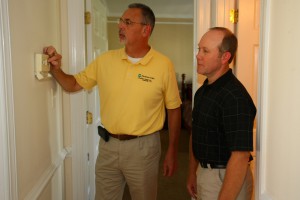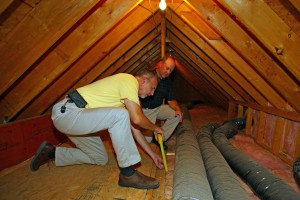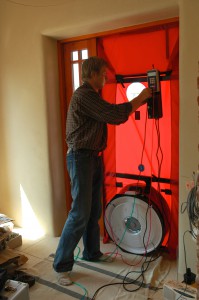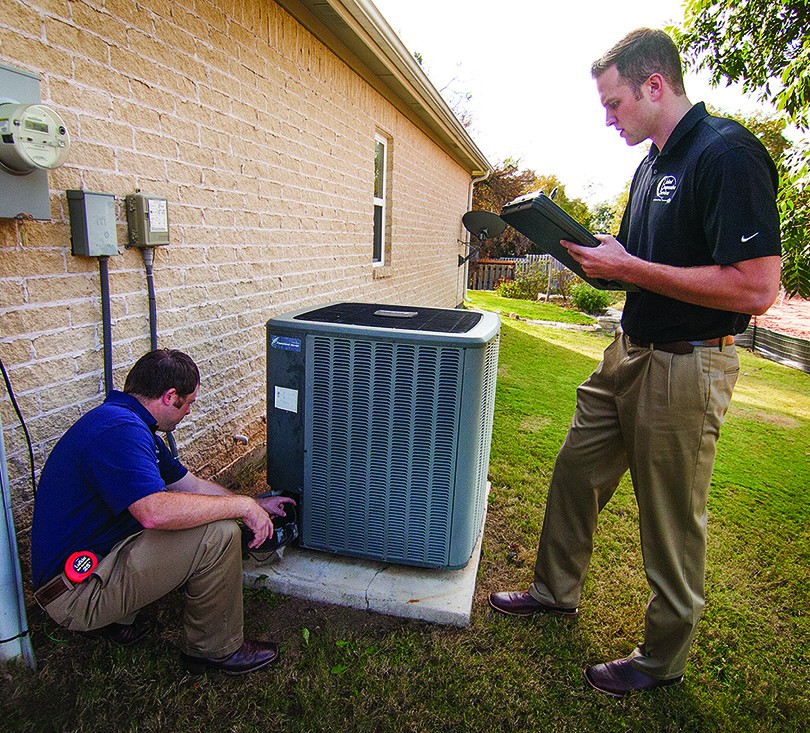By Patrick Keegan and Amy Wheeless

Recommendations can include changing how you use energy, such as turning the thermostat down while you are out. Photo Credit: Piedmont Electric Membership Corporation
Spending a few hundred dollars on an energy audit now can save you thousands of dollars over time. A home energy audit is a detailed assessment of your home that can give you a roadmap for future energy-related investments.
An energy audit can:
• Help you decide what efficiency investments will be most effective in reducing your energy bills.
• Identify problem areas in your home, such as temperature inconsistencies, and offer solutions to those problems.
• Help you “right-size” new systems in your home, such as a new furnace, air conditioner or rooftop solar, and identify complementary measures that will help these large investments work most efficiently.
• Document your home’s efficiency to help improve its resale value.
Online audit tools can give you a basic understanding of how your home compares to similar ones. However, qualified and professional home energy auditors can use their experience and high-tech tools to provide a thorough report of your home’s challenges and opportunities. A professional energy audit can range from a quick, visual walk-through of the home to a more comprehensive, more informative – however, more expensive – assessment.

During the audit, accompany the auditor and ask lots of questions. Photo Credit: Piedmont Electric Membership Corporation.
Energy audits require an examination of the building envelope (i.e., attic, floor and exterior walls) and the energy systems in the home, such as the water heater, air conditioner and furnace. Follow the auditor during the inspection and ask questions so you can understand where the problems are, what you can address yourself and where you may need further professional help. The auditor may analyze your recent energy bills to determine what your energy is used for and if use has recently changed. Finally, the auditor will ask about the energy use behaviors for those who live in the home. For example, is someone home all day or does everyone leave for work and school?
Ford Tupper, an energy auditor with The Electric Cooperatives of South Carolina, says, “The residents’ habits can make a big impact on the energy bill and can also be the hardest to change. If you go from being a household with two working adults to one with a new baby and an adult home most of the day, your energy use is going to go up.”
An auditor may do some or all of the following tests:
• Blower door test: Windows are often the suspected cause for air leaks in the home, but there are usually larger and less obvious sources; a blower door test measures how airtight your home is and identifies where the air leaks are.
• Duct blaster: Ducts move the warm and cool air around your home; duct testing can measure whether your ducts are leaking.
• Thermographic imaging: Seth Rosser, an energy advisor at United Cooperative Services in Texas, says, “Identifying where more insulation is needed is a key component in our energy audits — too little insulation will make a member use more energy than needed. Adding more can provide a quick return on investment.” Thermographic imaging is one way to identify where more insulation is needed. Infrared images show “cold” spots in a home’s envelope.
• Health and safety testing: Energy auditors are also trained to spot safety problems, such as a missing smoke detector or an appliance that could cause carbon monoxide issues. Some auditors can also test your home for radon.

A blower door test during a home energy audit can help identify sources of air leakage. Photo Credit: Tõnu Mauring
Following the assessment of your home, the auditor will analyze the information and make recommendations on what systems could be upgraded or behavior changes you can make to reduce energy use and improve comfort. If you take action based on your auditor’s recommendations, you could lower your energy bill 5 to 30 percent, or more.
Your electric co-op may be able to help you get started with your energy audit. Some co-ops even offer discounted audits or a list of qualified energy auditors in the area. Be sure whoever you hire is willing to answer questions, and plan to be home during the audit — it is a great opportunity to learn what makes your home tick and how you can make it even better.
This column was written by Pat Keegan and Amy Wheeless of Collaborative Efficiency. For more information on ensuring quality energy efficiency work, please visit: www.collaborativeefficiency.com/energytips or email Pat Keegan at energytips@collaborativeefficiency.com.

